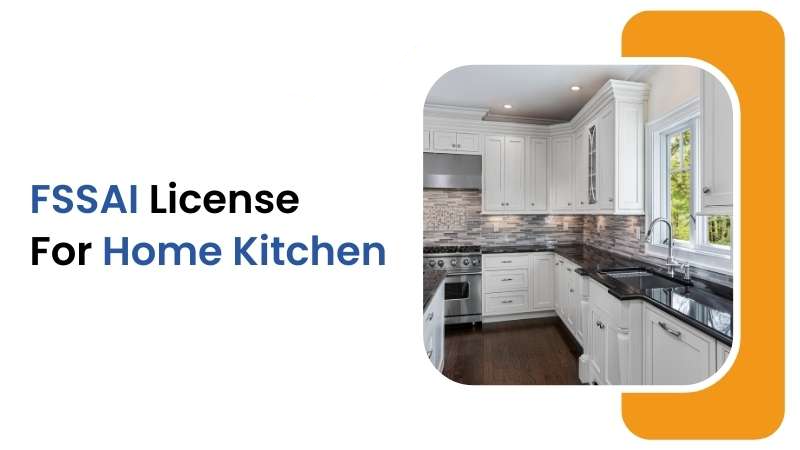Obtaining an FSSAI License for Home Kitchen: A Comprehensive Guide
In recent years, the concept of home-based culinary ventures has gained significant popularity. Whether you’re whipping up delectable treats or crafting artisanal dishes, ensuring food safety is paramount. This guide provides a detailed roadmap for obtaining an FSSAI (Food Safety and Standards Authority of India) license for your home kitchen, ensuring that your culinary endeavors align with regulatory norms and standards.

Food License ( FSSAI ) For Home Kitchen Application Form ( ⭐⭐⭐⭐⭐ 4.5 / 5 Rating Service | ✅ Hassle Free Documentation | ✅ Best Customer Support | ✅ Lowest Cost | ✅ Online Verified Process )
Table of Contents
- Introduction to FSSAI License for Home Kitchen
- Importance of FSSAI License for Home-Based Food Businesses
- Types of FSSAI Licenses: Which One Do You Need?
- Basic FSSAI Registration
- State FSSAI License
- Central FSSAI License
- Eligibility Criteria for Home Kitchen FSSAI License
- Annual Turnover Threshold
- Registration vs. Licensing
- Documents Required for FSSAI License Application
- Personal Identification Documents
- Proof of Address
- Kitchen Layout and Photographs
- Application Process: Step-by-Step Guide
- Online Application Submission
- Verification and Inspection
- Benefits of Having an FSSAI License for Home Kitchen
- Legal Compliance
- Consumer Confidence
- Access to Markets and Platforms
- Maintaining Food Safety Standards
- Hygiene Practices
- Ingredient Sourcing
- Frequently Asked Questions (FAQs)
- Conclusion
Introduction to FSSAI License for Home Kitchen
The FSSAI License is a legal requirement for any food business in India, including Home-Based Kitchens. It ensures that the food produced meets safety and quality standards, promoting consumer well-being.
Importance of FSSAI License for Home-Based Food Businesses
An FSSAI license lends credibility to your home kitchen venture, assuring customers that your offerings adhere to stringent quality and hygiene standards. It demonstrates your commitment to food safety.
Food License ( FSSAI ) For Home Kitchen Application Form ( ⭐⭐⭐⭐⭐ 4.5 / 5 Rating Service | ✅ Hassle Free Documentation | ✅ Best Customer Support | ✅ Lowest Cost | ✅ Online Verified Process )
Types of FSSAI Licenses: Which One Do You Need?
- Basic FSSAI Registration: Suitable for small-scale and home-based businesses with limited operations.
- State FSSAI License: Required for medium-sized enterprises operating within a state.
- Central FSSAI License: Essential for businesses with larger operations, including those that operate in multiple states.
Eligibility Criteria for Home Kitchen FSSAI License
- Annual Turnover Threshold: If your annual turnover exceeds the specified limit, you need to obtain the relevant FSSAI license.
- Registration vs. Licensing: Home-based kitchens with a lower turnover might be eligible for Basic FSSAI Registration, while those exceeding the threshold should opt for a state or central license.
Documents Required for FSSAI License Application
- Personal Identification Documents: Aadhaar card, PAN card, passport-sized photographs, etc.
- Proof of Address: Residential address proof.
- Kitchen Layout and Photographs: Images of the kitchen layout and setup to showcase compliance with hygiene standards.
Food License ( FSSAI ) For Home Kitchen Application Form ( ⭐⭐⭐⭐⭐ 4.5 / 5 Rating Service | ✅ Hassle Free Documentation | ✅ Best Customer Support | ✅ Lowest Cost | ✅ Online Verified Process )
Application Process: Step-by-Step Guide
- Online Application Submission: Submit the required documents and details through the our FSSAI online consultancy portal.
- Verification and Inspection: After application submission, the FSSAI authorities might conduct a physical inspection to verify compliance.
Benefits of Having an FSSAI License for Home Kitchen
- Legal Compliance: Operating with a valid FSSAI license ensures adherence to food safety regulations.
- Consumer Confidence: Customers trust businesses that prioritize food safety and hygiene.
- Access to Markets and Platforms: Many online food delivery platforms require an FSSAI License for Registration.
Food License ( FSSAI ) For Home Kitchen Application Form ( ⭐⭐⭐⭐⭐ 4.5 / 5 Rating Service | ✅ Hassle Free Documentation | ✅ Best Customer Support | ✅ Lowest Cost | ✅ Online Verified Process )
Maintaining Food Safety Standards
- Hygiene Practices: Ensure proper hand hygiene, utensil sanitation, and safe food handling.
- Ingredient Sourcing: Use fresh and safe ingredients from reliable sources.
List of some Popular Home-Based Food Businesses in India:
- Bakery and Confectionery: Home bakers and confectioners creating cakes, cupcakes, cookies, and other sweet treats.
- Cooking Classes: Offering cooking lessons and workshops for various cuisines and dishes.
- Catering Services: Providing catering services for small gatherings, parties, and events.
- Tiffin Services: Preparing and delivering homemade meals to offices, schools, and homes.
- Pickles and Preserves: Making and selling homemade pickles, jams, and preserves.
- Spice Blends and Mixes: Creating and selling homemade spice blends, masalas, and cooking mixes.
- Healthy Snacks: Producing and selling nutritious and healthy snacks like granola bars, energy bites, and roasted nuts.
- Homemade Sauces and Condiments: Making and selling homemade sauces, chutneys, and condiments.
- Ice Cream and Desserts: Crafting homemade ice creams, gelatos, and desserts.
- Tea and Coffee Blends: Creating unique tea and coffee blends and selling them online.
- Packed Foods: Offering ready-to-eat packaged meals, parathas, and snacks.
- Nutrition Consultation: Providing personalized nutrition consultation services.
- Culinary Workshops: Conducting workshops on food styling, photography, and recipe development.
- Food Subscription Boxes: Curating and delivering monthly food subscription boxes with unique offerings.
- Homemade Chocolates: Making and selling handmade chocolates and truffles.
- Regional Specialties: Preparing and selling regional specialties from different Indian states.
- Special Diet Foods: Catering to dietary preferences like vegan, gluten-free, and keto.
- Sweets and Mithais: Crafting traditional Indian sweets and mithais.
- Masala Powders: Preparing and selling homemade masala powders for cooking.
- Cookbooks and Recipe Cards: Creating and selling recipe books and cards.
- Homemade Drinks: Offering homemade beverages like herbal teas, lemonades, and fruit juices.
- Homemade Baby Food: Making and selling organic and nutritious baby food.
- Street Food Varieties: Offering popular street food items like chaat and pani puri.
- Homemade Pasta and Noodles: Crafting fresh pasta and noodles for sale.
- Food Gifting: Creating food hampers and gift sets for special occasions.
These are just a few examples of the diverse home-based food businesses that individuals are successfully running in India. The food industry offers numerous opportunities for passionate cooks and culinary enthusiasts to turn their talents into profitable ventures.
Frequently Asked Questions (FAQs)
1. Is an FSSAI license mandatory for a small home kitchen?
Ans:- Yes, even small home kitchens must obtain an FSSAI license if their turnover exceeds the specified limit.
2. Can I operate without an FSSAI license?
Ans:- No, operating a food business without an FSSAI license is illegal and can result in penalties.
3. Can I apply for an FSSAI license online?
Ans:- Yes, the FSSAI license application process is primarily online, making it convenient for applicants.
4. How can I determine which type of FSSAI license I need for my home-based food business?
Ans:- The type of FSSAI license you need depends on your annual turnover and the scale of your operations. If your turnover is low, you might qualify for basic registration, while larger turnovers might require state or central licenses.
5. What is the validity period of an FSSAI license for a home kitchen?
Ans:- The validity period of an FSSAI license varies based on the type of license. Basic registration has a validity of 1 to 5 years, while state and central licenses generally have a validity of 1 to 5 years as well.
6. Can I apply for an FSSAI license if my kitchen is not located at my residence?
Ans:- Yes, you can apply for an FSSAI license even if your kitchen is not located at your residence. However, you need to provide accurate details about the kitchen’s location and premises during the application process.
7. Is it possible to upgrade from basic registration to a state or central license in the future?
Ans:- Yes, you can upgrade your FSSAI license from basic registration to a state or central license if your business expands and meets the eligibility criteria for the higher-level licenses.
8. Can I make modifications to my FSSAI license details after it is issued?
Ans:- Yes, you can make modifications to your FSSAI license details if there are changes in your business operations, contact information, or other relevant details. However, it’s important to update the authorities promptly.
9. Are there any specific labeling requirements for home-based food products under FSSAI regulations?
Ans:- Yes, FSSAI regulations include labeling requirements for all food products, including those produced in a home kitchen. Labels must include essential information such as product name, ingredients, nutritional information, and allergen warnings.
10. Can I apply for an FSSAI license if I only sell food products online?
Ans:- Yes, if you sell food products online, you are still required to obtain an FSSAI license. Many online platforms and marketplaces also require sellers to provide their FSSAI license details for registration.
11. What happens if I fail the FSSAI inspection for my home kitchen?
Ans:- If you fail the FSSAI inspection, you will receive feedback on the areas that need improvement. It’s crucial to address the identified issues and make the necessary changes to meet the food safety standards before reapplying for inspection.
12. Is it possible to transfer my FSSAI license if I change the location of my home kitchen?
Ans:- Yes, you can transfer your FSSAI license if you change the location of your home kitchen. However, you need to inform the FSSAI authorities about the change and follow the necessary procedures for transferring the license.
13. What should I do if my FSSAI license expires?
Ans:- If your FSSAI license expires, you need to apply for renewal before the expiration date to ensure uninterrupted compliance with food safety regulations and access to benefits.
14. Are there any specific training or certification requirements for home-based food businesses?
Ans:- While there might not be specific training requirements, it’s recommended to undergo food safety and hygiene training to ensure that you are well-equipped to maintain high standards in your home kitchen.
Food License ( FSSAI ) For Home Kitchen Application Form ( ⭐⭐⭐⭐⭐ 4.5 / 5 Rating Service | ✅ Hassle Free Documentation | ✅ Best Customer Support | ✅ Lowest Cost | ✅ Online Verified Process )
Conclusion
Acquiring an FSSAI license for your home kitchen is more than a legal obligation; it’s a commitment to food safety and consumer well-being. By following the steps outlined in this guide, you can navigate the licensing process with confidence and embark on your culinary journey while upholding the highest standards of food safety.

